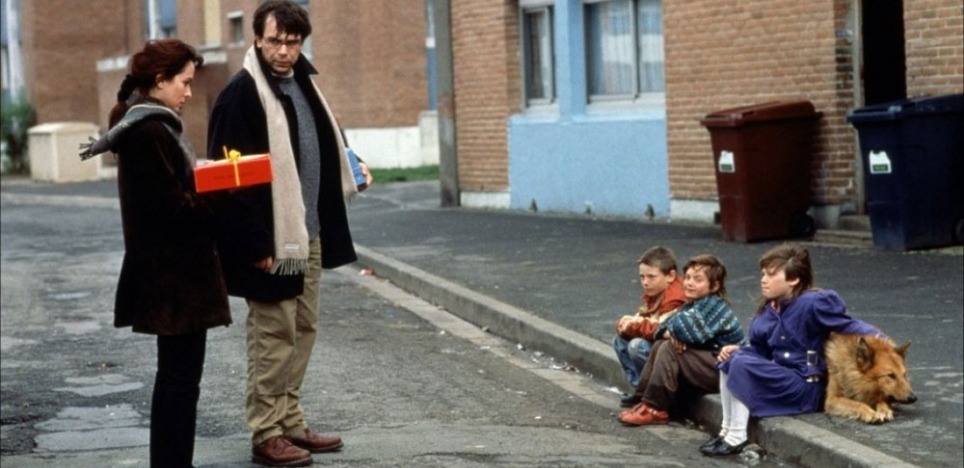Many people do work that enables them to improve the lives of others. But often women and men in the service professions are not paid enough, and they don't have the clout or the status of those in high-profile careers. Director Bertrand Tavernier has created a fluid and engrossing drama around a kindergarten principal in a small and impoverished French town where unemployment is high and community morale is low. Daniel struggles with one crisis after another as he tries to do what is best for the children. The mayor is cutting school services, and parents can't pay for lunches and school activities. Luckily, Daniel is surrounded by a group of caring and committed teachers, a feisty public health nurse, Samia, and his girlfriend, Valeria, who is very supportive of his work.
According to the director, Bertrand Tavernier, this drama is based on the real-life experiences of his son-in-law. "Daniel is not the Rambo of the kindergarten," he said in an interview. "He needs help. He needs to have people working with him. And so, my aim was to pay a tribute, an homage, to these people who are working on the bottom of the level. They are incredible. Without them, without a thousand Daniels, of Valerias or Samias, that we have in France today, there would have been a social implosion. It would have been terrifying. So I think they deserve respect. And I have great admiration for them and I love to make films about people I admire."
This Values & Visions Guide centers around some of the major themes in the film with questions and exercises about helping out, anger, annoying people, the problem of self-interest, learning from life's journey, the poetic element of chaos, and the teachings in difficult times. The film, which is subtitled, runs 118 minutes and has not been rated. For a detailed review and plot synopsis, click here.
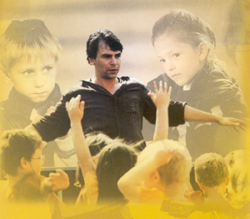
1. Helping Out
"Helping out is not some special skill. It is not the domain of rare individuals. It is not confined to a single part or time of ourselves. We simply heed the call of that natural caring impulse within and follow where it leads," Ram Dass and Paul Gorman write in How Can I Help?
- What is the biggest obstacle Daniel faces in his day-by-day efforts to help the children in his school? What character qualities enable him to express his caring impulses in such a natural and compassionate way?
- Share three ways that you help others through your work. What service professionals are most overlooked in terms of the contributions they make to your community? What obstacles or resistances have your encountered when trying to express the natural caring impulse within you? Give an example.
2. Anger Stirs the Juices
"Anger stirs the juices of our souls to the point of white heat. We take upon ourselves the righteousness of God and never manage, despite it, to order the universe to our own ends," Joan Chittister notes in There Is A Season.
- What is your response to the anger Daniel unleashes on the Child Welfare Services? What is the end result of his righteous indignation?
- When was the last time you unleashed your anger at work? What was the situation and how did it turn out? Do you think it is important to express this emotion or is it best to keep it locked up inside? Give a reason for your answer.
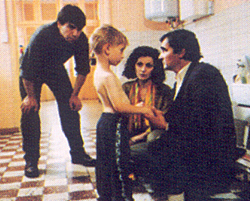
3. Annoying People
Harold Kushner in The Lord Is My Shepherd says: "Theologian and mystic Zalman Schachter describes how once a year, he convenes an imaginary dinner party in his mind, to which he invites everyone with whom he has had a run-in during the past year. Everyone with whom he is on bad terms, everyone who has been mean to him or his family, everyone who has hurt, offended, or disappointed him is invited to this imaginary feast. In the course of the mental banquet, Schachter goes around the table and explains to the guests that he has invited them to thank them for the various gifts they have taught him. . . . As a result, Schachter imagines himself telling them, he has become more realistic about what he can expect of people and more aware of the danger of he himself not hearing the cries of those who turn to him."
- What does Daniel have to learn from: the government inspector who evaluates him? the poverty stricken mother who drinks too much? the couple who lack the energy to get up in time to get their child to school on time? the mayor? the child welfare services representative? others of your choice?
- Try this exercise, including people you deal with at work. After going through the imaginary dinner party, debrief with your discussion group or in your journal. What feelings arose in you as you explained to each guest why he or she was there? Who aroused your deepest emotions? How did you deal with that? If you were included in this exercise by someone else at work, what would be the reason for your presence at the party?
4. The Problem of Self-Interest
In Credo, William Sloane Coffin writes: "The primary problems of the planet arise not from the poor, for whom education is the answer; they arise from the well-educated, for whom self-interest is the problem."
- Talk about the various ways poor people are depicted and dealt with in this drama. What is your response to the mother who doesn't have the money to pay for the power in her apartment? For which character is self-interest an impediment to caring about the poor in their community?
- What new insights have you gained from this movie into the plight of the poor and the best ways to serve their needs?
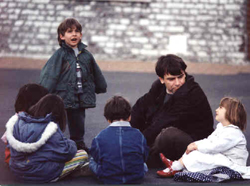
5. Learning from Life's Journey
"Journal writing is a perennial practice because it is such a helpful way of honoring, pondering and learning from life's journey," Carl J. Koch writes in Journal Keeping: Exploring a Great Spiritual Practice.
- What do you learn about Daniel from the voiceover readings from his journal throughout the film? What role does nature play in his view of the world?
- Have you ever tried journal keeping as a means of getting in touch with what is going on at work? What happened? Another benefit of writing down your thoughts on a regular basis would be to see the relationship between your work and the rest of your life. Try this for a few days and see what comes up.
6. The Poetic Element of Chaos
In Hymns to an Unknown God, Sam Keen quotes Ben Shanh: "I love chaos: it is the mysterious, the unknown road. It is the ever-unexpected, the way out: it is freedom, it is our only hope. It is the poetic element in a dull and ordered world."
- Share your responses to the creative chaos that Valeria designs for the school fair. In what ways is it an antidote to the chaos that usually encompasses Daniel and the school?
- Do you agree with Shahn about the creative and liberating potential of chaos? Or have you found that chaos is something you avoid like the plague? How could you use chaos as a poetic element in your work life?
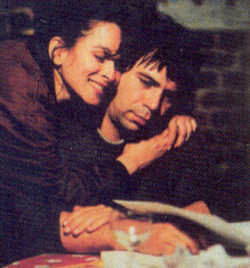
7. Difficult Times Bring the Greatest Teachings
"The purest and truest spiritual life begins with accepting everything that comes to you as a gift and teaching. . . . The most difficult times sometimes bring the most important teachings. Each lesson is another step toward learning to accept what comes to us as material to be transformed into the grace of spiritual life," Bradford Keeney writes in Everyday Soul.
- In what sense is Daniel a hero in your eyes? What does he learn during his "rough year" as a teacher?
- Talk a bit about the roughest year you have ever had at work. What challenges, obstacles, problems tested your mettle? Tavernier, the director, talks about the importance of co-workers when you are trying to do something important in the world. How has the support of others at work enabled you to be the best that you can be?
This guide is one in a series of more than 200 Values & Visions Guides written by Frederic and Mary Ann Brussat. Text copyright 2004 by Frederic and Mary Ann Brussat. This guide is posted as a service to visitors to www.SpiritualityandPractice.com. It may not be photocopied, reprinted, or distributed electronically without permission from Frederic and Mary Ann Brussat. For this permission and for a list of other guides in the Values & Visions series and ordering information, email your name and mailing address to: brussat@spiritualrx.com.
